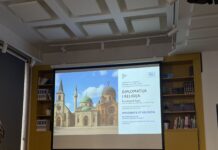On Tuesday, ASP Board Member Ambassador Don Beyer spoke on his experiences as Ambassador to Switzerland and Liechtenstein. Outlining the three roles of an ambassador as 1.) government to government diplomacy, 2.) economic statecraft, and 3.) public diplomacy, Beyer presented on a myriad of topics relevant to U.S. relations with Switzerland, ranging from the Iranian nuclear program to trade and business policy.
In discussing public diplomacy, Beyer broke the practice into three elements: listening, learning and leading.
To employ these elements, Beyer suggested taking the approach of a political campaign, breaking Switzerland down into its local political entities and applying a strategy become a presence in as many of these states and districts as possible.
During his remarks, Beyer made special emphasis of his efforts in listening, and seeking to build relationships and connections by decreasing the “degrees of separation” between himself and the Swiss people. This included visiting all 26 cantons (states), and making himself as accessible as possible: including being seen places you wouldn’t expect to see an American ambassador. Demonstrating his openness in Switzerland, Beyer hosted over 6000 visitors and more than 400 overnight guests at his home.
He also commented on the importance of learning, noting his concurrence with many foreign services officers that it was incredibly important for an ambassador to become the expert on the host country. That means knowing the culture, the history, and the language(s) of that country, as well as the subtleties of its political system.
Beyer also covered many lessons about Switzerland that he felt could be beneficial to the U.S. to better understand. This included, but was not limited to, policies related to passing a balanced budget, education spending, concordance politics, land use planning, farming, and business practices.
 In leading public diplomacy efforts, Beyer contended that influence in public diplomacy comes through building relationships and being able to tell the American story. More effective at accomplishing strategic ends than simply advocating U.S. policy, Beyer felt that better explaining the intricacies of America’s story beyond its sometimes misleading outward appearance tends to help change minds. This includes the role of women in politics and business, immigration, American efforts to combat climate change, and more.
In leading public diplomacy efforts, Beyer contended that influence in public diplomacy comes through building relationships and being able to tell the American story. More effective at accomplishing strategic ends than simply advocating U.S. policy, Beyer felt that better explaining the intricacies of America’s story beyond its sometimes misleading outward appearance tends to help change minds. This includes the role of women in politics and business, immigration, American efforts to combat climate change, and more.
Additionally, Beyer spoke briefly on some of the institutional challenges that the foreign service and U.S. missions overseas face. For instance, the restrictions placed on building web content as a U.S. mission means that the U.S. reacts and produces content much more slowly than private industry. While this is improving, private industry has much more freedom to act promptly and readily than the U.S. Government. Of particular note, Beyer noted that the relatively short terms served by Ambassadors in-country tends to make building effective relationships difficult.
Overall, Ambassador Beyer presented a compelling and informative case about how Ambassadors are elemental to the practice of diplomacy, whether traditional or public. If you missed the event, please be sure to check the video, audio, and photos included below.














